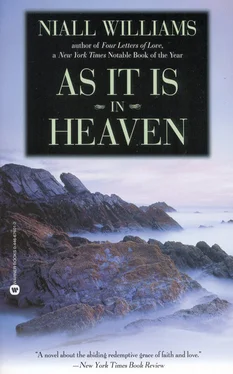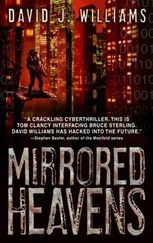Niall Williams
As It Is in Heaven
For Chris, who made the garden,
and for Deirdre and Joseph,
who play the music in it
“… on earth as it is in Heaven.”
— Our Father
“… ma gia volgeva il mio disio e’l velle
si come rota ch’igualmente e mossa,
l’amor che move: i sole e l’altre stelle.”
“… as a wheel turns smoothly, free from jars,
my will and my desire were turned by love,
The love that moves the sun and the other stars.”
— Dante, Paradiso
 There are only three great puzzles in the world, the puzzle of love, the puzzle of death, and, between each of these and part of both of them, the puzzle of God.
There are only three great puzzles in the world, the puzzle of love, the puzzle of death, and, between each of these and part of both of them, the puzzle of God.
God is the greatest puzzle of all.
When a car drives off the road and crashes into your life, you feel the puzzle of God. You feel the sharpness of its edges fall on top of you and know the immensity of the puzzle from the force of the life being crushed out of you. You want to lift the pieces and throw them away into the darkness. You feel the chill of loss, the drafty air, as if the walls of your soul have been knocked down in the night and you wake to realize that you are living in a vast exposed emptiness.
When the man driving the car turns out to be a drunken priest who receives only minor injuries, you wonder if God was ever there at all, or if the puzzle itself was your own invention to excuse the existence of the random and the brutal where they crisscrossed our days.
Philip Griffin wondered. He wondered what crime his ten-year-old daughter could have committed, what grievous error she had made that had drawn the priest’s car upon her that afternoon. What fault could his wife, Anne, have been guilty of as she drove into Ranelagh to collect rosin for her daughter’s half-sized cello? In the weeks and months following the accident Philip Griffin asked the questions and could arrive at only one answer: there was none. The fault was his own, the judgement had fallen not on them but upon him. For it was the survivor who suffered. In the weeks following the funeral of his wife and daughter he had scoured the burnt bottom of his soul for the myriad failings of his love — the days he had said nothing, had returned from work with some bitterness and left the children doing their homework, telling them to leave him alone when they came with copies, raising his newspaper like a drawbridge and retreating inside the loveless world of facts and news, until a knock came on the room door and he walked out to tea; the evenings he did not tell them he loved them but told them only to go to bed and be quiet or he’d be cross. He searched out each of his failings and then concluded that they were so numerous it was perfectly clear why God had smote his life with suffering. Understanding that was the only way he was able to continue living, for in his eyes his living with the hurt was a kind of cleansing. Mary and Anne were in heaven awaiting him, and he would be there to join them one day, when he had done whatever he could for his remaining child, Stephen; when life had at last purged his sins and cancer would arrive.
There was peace in that. The puzzle of God was not so bad after all, and Philip could endure suffering, knowing that at least when it was over it would mean he was forgiven.
In twenty years that day had not come. His son, Stephen, had become a schoolteacher and moved away from Dublin to the west. The fracture that had fallen between them the day of the crash, when they had each retreated into great guilty rooms of silence, had grown steadily wider, and the father had felt each year the weakening of his ability to reach his son. Stephen was a lone figure; he was tall and silent and intense, and had vanished from his father into the world of history books before he had finished his teens. Now he arrived one weekend a month to sit opposite his father in the sitting room and correct copies and read the newspaper while Puccini played on the small stereo and the light died in the street outside.
“Hello.”
It was a late-autumn afternoon. The chestnut leaves had fallen in the garden and blackened the grass, which Philip Griffin did not rake. A small man, he sat in the front window with the Venetian blinds open and watched the road for the coming of his son’s car. When it entered the driveway, he had looked away and gazed at the air as if watching the music. He heard Stephen turn his key in the door, but he did not get up. He sat with his hands on his knees and waited with the terrible immobility of those who have lost the means of talking to their children.
“Hello,” Stephen said again.
The music was playing. His father raised his right hand three inches off his knee as a greeting, but said nothing more. He was listening to the singing like a man looking at a faraway place. There were words in the air, but Philip Griffin did not need to say them, he did not need to say: “When your mother was alive, she liked this one,” for Stephen already knew it. He knew the terrible sweetness of the melancholy in that music and how it soothed his father to be there within it. He said nothing and sat down.
On the small tape recorder beside his chair Philip Griffin turned up the volume and let the music fill the space between them. They had not seen each other for three weeks, but sat in their armchairs, surrounded by Puccini, as if the spell of the music would bear no interruption and the memory of the slim and tall figure of Anne Griffin was walking in the room. The sorrowfulness of the aria was cool and delicious; it was beyond their capability of telling, and while it played, father and son lingered in its brief and beautiful grief, each thinking of different women.
The heavy golden curtains of the room were tied back from the window; they had not been closed in many years, and their gathered folds held within them the ageing dust of the man who sat there every day. Philip Griffin had his face turned to the open Venetian blind, and bands of orange light fell across it as the streetlights came on. He was sixty-eight years old. He had never been handsome, but had once been lively. Now his hair grew like curling grey wires over his ears and in his ears, while the crown of his head was so bare it looked vulnerable and expectant of blows. As he sat he held his hands in his lap and sometimes looked down at them and turned them over, as if searching for traces of the cancer he imagined must be growing inside him. He was a tired man who had grown to dislike company. The place in his spirit where he was broken had grown so familiar to him, and he had so long ago abandoned the notion of any fingering or magic that could repair it, that his living had assumed a frayed quality, waiting for the last thread to give.
The music played, he held his hands. When three arias had ended, he reached down and clicked off the machine. “Well,” he said, and looked through the darkness of the room to see with astonishment the changed face of his son.
 You can know a lot about a man when you are measuring him for trousers. You can know his own sense of expectation about the world and whether he feels himself fitting into it or not. Sometimes he has grown beyond himself, and the extra inches that may be the loss of youth are hidden by the quick thumb on the tape measure. Sometimes the inches are the inches of pleasure and the man allows them like the proof of his own expansion, the feasting and fortune he has known. He can be told he is larger now, for he feels the responsibilities of his age and is not yet aware of his own diminishment. The tape measure tells a thousand stories. As a tailor in Clery’s, Philip Griffin had made a legion of men fit better into the world and, looking at his son in the armchair, knew the slackness of his trouser belt, the looseness of his collar were the telltale signs of love or death. God could not kill the whole family before him, he figured, and so he knew it was the former.
You can know a lot about a man when you are measuring him for trousers. You can know his own sense of expectation about the world and whether he feels himself fitting into it or not. Sometimes he has grown beyond himself, and the extra inches that may be the loss of youth are hidden by the quick thumb on the tape measure. Sometimes the inches are the inches of pleasure and the man allows them like the proof of his own expansion, the feasting and fortune he has known. He can be told he is larger now, for he feels the responsibilities of his age and is not yet aware of his own diminishment. The tape measure tells a thousand stories. As a tailor in Clery’s, Philip Griffin had made a legion of men fit better into the world and, looking at his son in the armchair, knew the slackness of his trouser belt, the looseness of his collar were the telltale signs of love or death. God could not kill the whole family before him, he figured, and so he knew it was the former.
Читать дальше

 There are only three great puzzles in the world, the puzzle of love, the puzzle of death, and, between each of these and part of both of them, the puzzle of God.
There are only three great puzzles in the world, the puzzle of love, the puzzle of death, and, between each of these and part of both of them, the puzzle of God.









